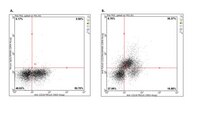TLR10 Is a B Cell Intrinsic Suppressor of Adaptive Immune Responses.
Hess, NJ; Jiang, S; Li, X; Guan, Y; Tapping, RI
J Immunol
198
699-707
2016
Mostra il sommario
Toll-like receptors play a central role in the initiation of adaptive immune responses with several TLR agonists acting as known B cell mitogens. Despite thousands of publications on TLRs, the function of TLR10 remains unknown. We have found that Ab-mediated engagement of TLR10 on primary human B cells suppresses B cell proliferation, cytokine production, and signal transduction. When challenged with either a T independent or T dependent Ag, TLR10 transgenic mice exhibit diminished Ab responses. Adoptive transfer of splenic B cells into B cell-deficient mice revealed that the suppressive effects on Ag-specific humoral immune responses are entirely B cell intrinsic. Our results demonstrate that TLR10 has a functional role within the B cell lineage that is distinct from that of other TLR family members and may provide a potential therapeutic target for diseases characterized by dysregulated B cell activity. | 27956526
 |
TLR10 suppresses the activation and differentiation of monocytes with effects on DC-mediated adaptive immune responses.
Hess, NJ; Felicelli, C; Grage, J; Tapping, RI
J Leukoc Biol
101
1245-1252
2016
Mostra il sommario
TLRs are important pattern-recognition receptors involved in the activation of innate immune responses against foreign pathogens. TLR10 is the only TLR family member without a known ligand, signaling pathway, or clear cellular function. Previous work has shown that TLR10 suppresses proinflammatory cytokine production in response to TLR agonists in a mixed human mononuclear cell population. We report that TLR10 is preferentially expressed on monocytes and suppresses proinflammatory cytokine production resulting from either TLR or CD40 stimulation. TLR10 engagement affects both the MAPK and Akt signaling pathways, leading to changes in the transcriptome of isolated human monocytes. Differentiation of monocytes into dendritic cells in the presence of an αTLR10 mAb reduced the expression of maturation markers and the induction of proinflammatory cytokines, again in response to either TLR or CD40 stimulation. Finally, in coculture experiments, TLR10 differentiated dendritic cells exhibited a decreased capacity to activate T cells as measured by IL-2 and IFN-γ production. These data demonstrate that TLR10 is a novel regulator of innate immune responses and of the differentiation of primary human monocytes into effective dendritic cells. | 28235773
 |









